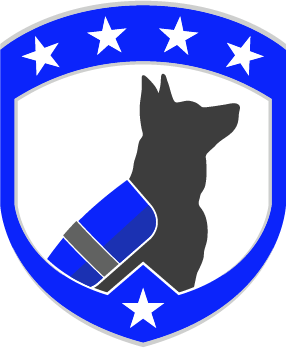Apply for First Responder
Service Dog
Support a First Responder
Donate Here!
First Responders
An estimated 30 percent of first responders develop depression, stress, posttraumatic stress disorder (PTSD) and other mental health consequences.
First responders face difficult, dangerous, and draining situations, often providing emotional and physical support to survivors. These essential duties increase the risk for trauma in the first responders serving our communities.
A Psychiatric/PTSD service animal will be able to go anywhere with their handler and assist them in times of high anxiety and stress. A service dog will provide emotional support, reintegration into society, reduce depression, reduce the frequency and severity of flashbacks, anchor handler to the present, and reduce suicidal ideation.
How can a service dog help?
Individuals with PTSD often feel unsafe and unsure of reality, especially in public settings. Service dogs for PTSD can help ground their handler to reality, prevent people from crowding or rushing up to them and provide the emotional support needed to de-escalate anxieties. They can be trained to recognize the signs of a panic attack, wake individuals experiencing night terrors and regulate emotional responses through pressure.
Individuals with PTSD often feel unsafe and unsure of reality, especially in public settings. Service dogs for PTSD can help ground their handler to reality, prevent people from crowding or rushing up to them and provide the emotional support needed to de-escalate anxieties. They can be trained to recognize the signs of a panic attack, wake individuals experiencing night terrors and regulate emotional responses through pressure.
Benefits of Phsychiatric/PTSD Service Dog Training:
- Increase activity and integration into society: Dogs are active and need to be exercised regularly, the responsibility of caring for a service animal will force their handler to get out and exercise. A routine is established and ties to the future are forged again.
- Create a sense of safety: Public settings and crowds are an enormous trigger for most individuals suffering from PTSD. Psychiatric service dogs are trained to create a physical barrier between their handler and crowds of people.
- Ground in reality, redirect hyper-vigilance: Hyper-vigilance is a symptom of PTSD and creates constant tension and paranoia within suffers. Service dogs are trained to recognize their handler’s warning signs for anxiety, hyper-vigilance, and panic attacks and redirect that energy into positive coping skills and grounding techniques such as petting the dog.
- Reduce nightmares and flashbacks: One of the most emotionally challenging situations for individuals with PTSD to deal with are flashbacks and nightmares. They can transport an individual back to a terrifying time in their life where they have felt unsafe, threatened, and traumatized. A PTSD service animal is trained to bring their handler back to reality quickly and calmly, ground the individual, and help them to feel safe in their environment again.
